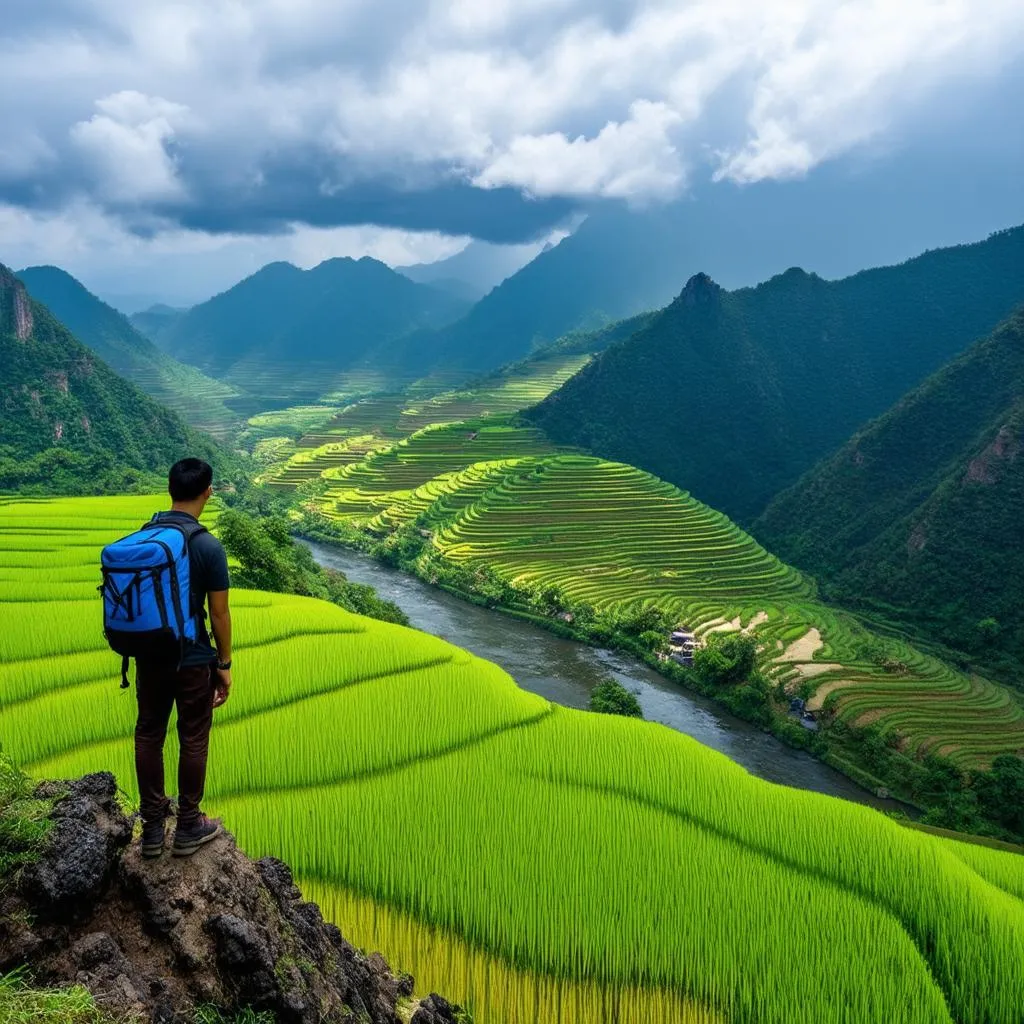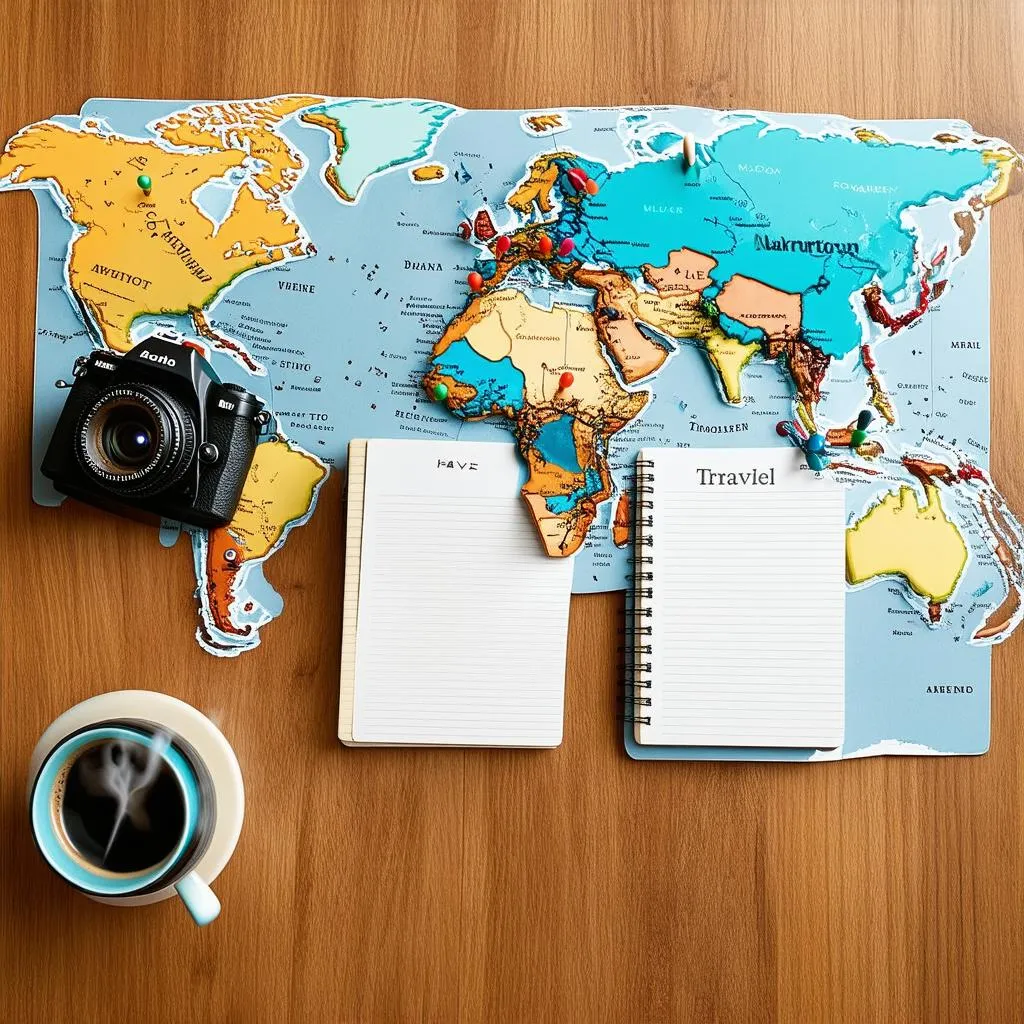“A good traveler has no fixed plans, and is not intent on arriving” – Lao Tzu. This quote, etched into the very soul of wanderlust, speaks volumes about the true essence of travel. It’s not just about ticking off destinations on a list, but about embracing the journey with an open heart and a flexible itinerary.
Imagine yourself standing at a bustling train station in Hanoi, the scent of strong coffee and spices filling the air. Instead of rushing to catch a pre-booked train to Hoi An, you allow yourself to be drawn in by the rhythmic chanting of a street musician. He tells you tales of hidden waterfalls and ancient temples off the beaten path. Intrigued, you decide to follow his advice, embarking on an unexpected adventure that wasn’t part of your initial plan. This, my friends, is the spirit of a good traveler, one who embodies the wisdom of Lao Tzu.
Deciphering the Tao of Travel
Lao Tzu, an ancient Chinese philosopher, emphasized the importance of “wu wei”, which translates to “effortless action” or “going with the flow”. When applied to travel, it means letting go of rigid plans and embracing spontaneity. This doesn’t mean you shouldn’t plan at all, but rather, be open to serendipitous detours and unexpected encounters.
Embracing the Unexpected
Think of your travel plan as a loose framework, a guideline rather than a rulebook. Leave room for spontaneity, for those moments where you stumble upon a hidden gem or strike up a conversation with a local that leads to an unforgettable experience.
- Detour to Delight: While researching your trip to Vietnam, you might be drawn to the bustling streets of Ho Chi Minh City or the tranquil beauty of Ha Long Bay. But what about those hidden gems tucked away in the countryside? Consider taking a detour to the Mekong Delta, where you can glide along peaceful canals, visit floating markets, and witness the daily rhythm of rural life.
- Engage with Locals: The heart of a destination lies with its people. Strike up conversations with locals, learn a few basic phrases in their language, and be open to their stories and perspectives. You might discover a hidden restaurant serving authentic pho, receive an invitation to a local festival, or even get tips on the best spots to watch the sunset.
Finding Balance in Your Journey
Embracing the Tao of travel doesn’t mean completely abandoning all plans. It’s about finding a balance between structure and spontaneity, between following your itinerary and following your heart.
Prepare for the Essentials: While you don’t need to plan every minute detail, it’s important to have the basics covered. Book your flights and accommodation in advance, especially during peak season. Research visa requirements, local customs, and basic phrases in the local language. This preparation will give you a safety net while still allowing for flexibility in your itinerary.
Listen to Your Intuition: Sometimes, your gut feeling knows best. If a particular activity or destination doesn’t feel right, don’t feel pressured to follow through. Trust your intuition and be open to changing your plans if something else calls to you.
Feng Shui and the Art of Travel
The principles of Feng Shui, the ancient Chinese art of harmonizing energy, can also be applied to your travels.
- Pack Light, Travel Free: Just as clutter in your home can block positive energy flow, overpacking can weigh you down both physically and mentally. Choose versatile clothing items that can be mixed and matched, and pack only the essentials.
- Embrace the Five Elements: Incorporate the five elements of Feng Shui – wood, fire, earth, metal, and water – into your journey. Visit a lush forest (wood), watch the sunrise over the ocean (fire), hike to a mountain peak (earth), explore ancient temples (metal), and relax by a serene lake (water) to create a sense of balance and harmony.
Planning Your Journey, Embracing the Unknown
Example Itinerary: A Taste of Vietnam
Day 1: Arrive in Hanoi, immerse yourself in the vibrant Old Quarter, and savor the flavors of authentic street food.
Day 2: Explore the historical landmarks of Hanoi, such as the Temple of Literature and Ho Chi Minh Mausoleum. In the evening, enjoy a traditional water puppet show.
Day 3: Embark on a scenic cruise through Ha Long Bay, marveling at the majestic limestone formations rising from the emerald waters.
Day 4-5: Journey to Hue, the former imperial capital, and delve into its rich history at the Imperial City and the tombs of the Nguyen Dynasty.
Day 6-7: Relax on the pristine beaches of Da Nang or Hoi An, indulge in delicious seafood, and soak up the coastal vibes.
Day 8-9: Venture off the beaten path to the Mekong Delta. Take a boat trip along the Mekong River, explore floating markets, and experience the tranquility of rural life.
Day 10: Depart from Ho Chi Minh City, taking with you unforgettable memories and the spirit of a true traveler.
 Vietnam Adventure
Vietnam Adventure
FAQs: Answering Your Travel Queries
Q: Is it really necessary to learn the local language?
A: While not absolutely necessary, learning a few basic phrases can greatly enhance your travel experience. It shows respect for the local culture and can lead to more authentic interactions with locals.
Q: How can I stay safe while traveling spontaneously?
A: It’s crucial to stay informed about your surroundings, avoid risky areas, and trust your instincts. Inform someone about your whereabouts, even if it’s a rough itinerary.
Q: I’m on a tight budget. Can I still embrace spontaneous travel?
A: Absolutely! Spontaneous travel doesn’t have to break the bank. Consider traveling during the shoulder season for lower prices, opt for budget-friendly accommodation options, and embrace local transportation.
Travelcar.edu.vn: Your Gateway to Unforgettable Journeys
For more travel inspiration, tips, and resources, visit travelcar.edu.vn. Discover hidden gems, plan your dream itinerary, and embark on a journey that nourishes your soul.
 Travel Planning
Travel Planning
Conclusion: Embrace the Journey, Embrace the Unknown
As you set out on your next adventure, remember the words of Lao Tzu. Let go of the need to control every detail, be open to the unexpected, and embrace the journey with a childlike sense of wonder. For it’s not just about arriving at your destination, but about the experiences, the encounters, and the lessons learned along the way. So pack your bags, open your heart, and let the journey unfold.